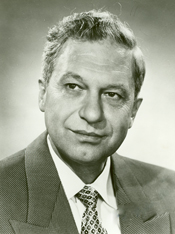William G. Bray
William G. Bray | |
|---|---|
 | |
| Member of the U.S. House of Representatives from Indiana | |
| In office January 3, 1951 – January 3, 1975 | |
| Preceded by | James E. Noland |
| Succeeded by | David W. Evans |
| Constituency | 7th district (1951–67) 6th district (1967–75) |
| Personal details | |
| Born | June 17, 1903 Mooresville, Indiana, U.S. |
| Died | June 4, 1979 (aged 75) Martinsville, Indiana, U.S. |
| Alma mater | Indiana University Law School (Juris doctor, 1927) |
| Occupation | Attorney |
| Awards | Silver Star |
| Military service | |
| Branch/service | United States Army Reserve |
| Years of service | 1941–1945 |
| Rank | captain |
William Gilmer Bray (June 17, 1903 – June 4, 1979) was a Republican member of the United States House of Representatives from Indiana.
Biography[]
Born on a farm near Mooresville, Indiana, Bray attended the public schools of Mooresville, Indiana. He was graduated from Indiana University Law School at Bloomington in 1927 and was admitted to the bar the same year.
He served as prosecuting attorney of the fifteenth judicial district of Indiana, Martinsville, Indiana from 1926 to 1930. He commenced the private practice of law in Martinsville, Indiana, in 1930.
Called to active duty from the US Army Reserve June 21, 1941, with the rank of captain and served with a tank company throughout the Pacific campaign, receiving the Silver Star. After the war, he was transferred to Military Government and served nine months in Korea as deputy property custodian. Bray was released from active duty in November 1946 with the rank of colonel. He returned to private law practice in Martinsville, Indiana.
Bray was elected as a Republican to the Eighty-second and to the eleven succeeding Congresses (January 3, 1951 – January 3, 1975). Bray voted in favor of the Civil Rights Acts of 1957,[1] 1960,[2] 1964,[3] and 1968,[4] as well as the 24th Amendment to the U.S. Constitution and the Voting Rights Act of 1965.[5][6] He was an unsuccessful candidate for reelection in 1974 to the Ninety-fourth Congress. He resumed the practice of law.
Named to be a commissioner to the American Battle Monuments Commission by President Gerald Ford from 1975 to 1978.

Resided in Martinsville, Indiana, where he died June 4, 1979. He was interred in White Lick Cemetery, Mooresville, Indiana.
Bray was an Indiana Freemason, and in 1993, William G. Bray Commandery No. 65 of the Masonic-related Knights Templar of Indiana was chartered in Mooresville in his honor and memory.[7]
References[]
- United States Congress. "William G. Bray (id: B000778)". Biographical Directory of the United States Congress.
- Specific
- ^ "HR 6127. CIVIL RIGHTS ACT OF 1957". GovTrack.us.
- ^ "HR 8601. PASSAGE".
- ^ "H.R. 7152. PASSAGE".
- ^ "TO PASS H.R. 2516, A BILL TO ESTABLISH PENALTIES FOR INTERFERENCE WITH CIVIL RIGHTS. INTERFERENCE WITH A PERSON ENGAGED IN ONE OF THE 8 ACTIVITIES PROTECTED UNDER THIS BILL MUST BE RACIALLY MOTIVATED TO INCUR THE BILL'S PENALTIES".
- ^ "S.J. RES. 29. CONSTITUTIONAL AMENDMENT TO BAN THE USE OF POLL TAX AS A REQUIREMENT FOR VOTING IN FEDERAL ELECTIONS". GovTrack.us.
- ^ "TO PASS H.R. 6400, THE 1965 VOTING RIGHTS ACT".
- ^ "Commanderies". www.indianaknightstemplar.com. Retrieved 2017-08-07.
![]() This article incorporates public domain material from the Biographical Directory of the United States Congress website http://bioguide.congress.gov.
This article incorporates public domain material from the Biographical Directory of the United States Congress website http://bioguide.congress.gov.
- 1903 births
- 1979 deaths
- Members of the United States House of Representatives from Indiana
- People from Mooresville, Indiana
- Indiana Republicans
- Indiana University Maurer School of Law alumni
- United States Army officers
- Republican Party members of the United States House of Representatives
- People from Martinsville, Indiana
- 20th-century American politicians

